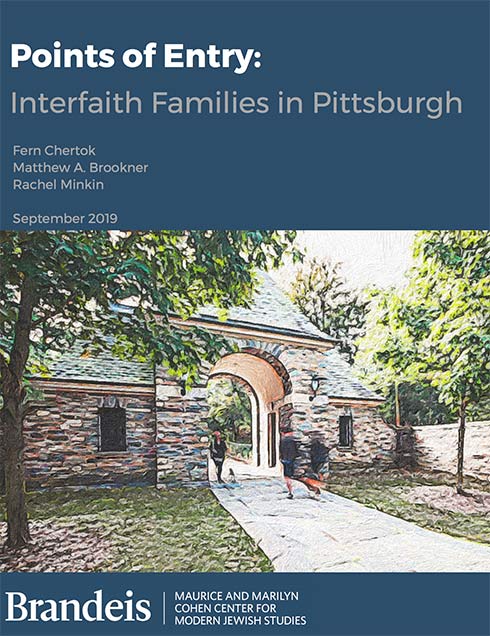Points of Entry: Interfaith Families in Pittsburgh
Fern Chertok, Matthew A. Brookner, and Rachel Minkin
 November 2019
November 2019
Conducted for the Jewish Federation of Greater Pittsburgh, this qualitative study describes the experiences and perspectives of members of the burgeoning population of interfaith couples in its catchment communities. The study focused on interfaith households including those that are and are not involved in home-based or communal Jewish life.
Twenty-nine couples (each couple included one Jewish partner and a partner from a different religious background) were interviewed. Eligible couples either did not have children or had no children older than age five.
Key Findings
Expand All
Our review of the institutional landscape in Pittsburgh revealed that there are few to no organizations, initiatives, or staff explicitly tasked with engaging intermarried households. In part, this reflects the assumption that interfaith families should not be treated any differently than inmarried ones. However, the lack of dedicated staff also means that no one is responsible for making sure that Federation-funded or initiated programs successfully attract interfaith couples, or that there is a comprehensive and accessible array of programs to meet the needs of this population.
The Pittsburgh Jewish community includes high rates of multi-generational residents and many Jewish members of interfaith couples have local extended family. These relatives provide information about Jewish opportunities and as well as a safe, warm environment to introduce non-Jewish partners to home-based Jewish life. The highly regarded daycare/preschools operated by synagogues and JCCs also act as entry points for couples who otherwise might not become involved with Jewish organizations. Many non-Jewish partners credited their positive experience with Jewish childcare centers as providing a way to connect with and feel more comfortable with Jewish traditions.
Interfaith couples that reside outside of Squirrel Hill recounted challenges in locating Jewish neighbors or finding local options for Jewish engagement. Contrary to the assumption that couples choosing to live outside of Squirrel Hill do not want to affiliate with the Jewish community, many couples described an array of factors that influence their decision making including housing prices, length of commute to work, proximity to family and friends and the quality of local public schools. Jewish partners who were raised in the suburbs of other cities expected the same type of thriving suburban Jewish community that they experienced during their childhoods.
Interfaith couples appreciate being welcomed into Jewish organizations and the effort that has been made to treating them like other young couples. Indeed, many of the issues they face are exactly the same as those encountered by young Jews married to other Jews. At the same time, intermarried couples face a unique set of decision points as they navigate the upbringing of children and their relationships with their Jewish and non-Jewish extended family. Interfaith couples are interested in programming that addresses their unique experiences and opportunities to meet similar couples to share stories, advice, experiences and concerns.
Just as there are stages in the development of individual identity, there are also phases in the life of a couple, each of which involves navigating unique challenges and areas of growth and change. Our interviews with couples suggested three stages in the development of young couples: before having children, new parents and parents of young children. Couples’ views about raising children evolved as they moved through these phase as did their needs for relevant content, approaches and role models.
Many of the couples we interviewed described themselves as not currently very active in Jewish organizations but noted that they were not averse to future involvement. Couples with few or no institutional affiliations, framed their lack of participation as being the result of the demands of career and families rather than on a distaste for religious organizations.
 November 2019
November 2019